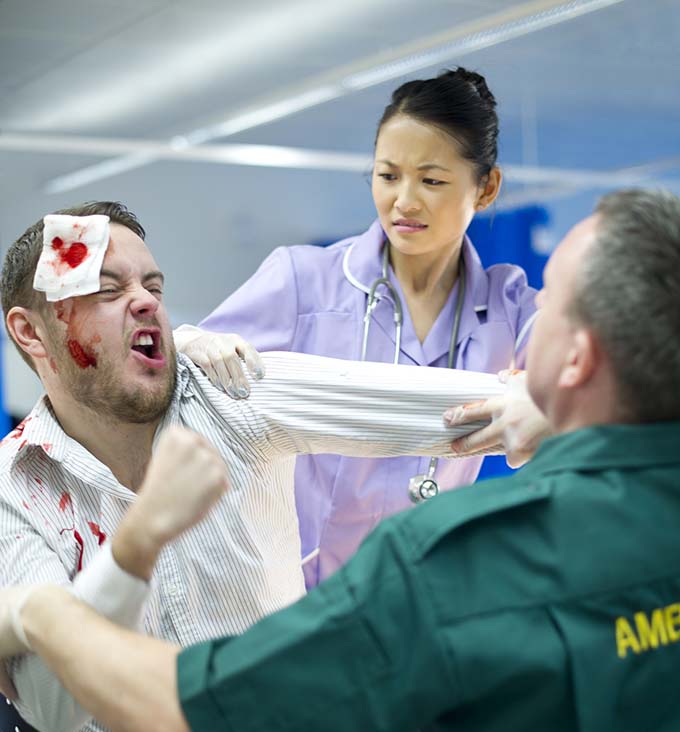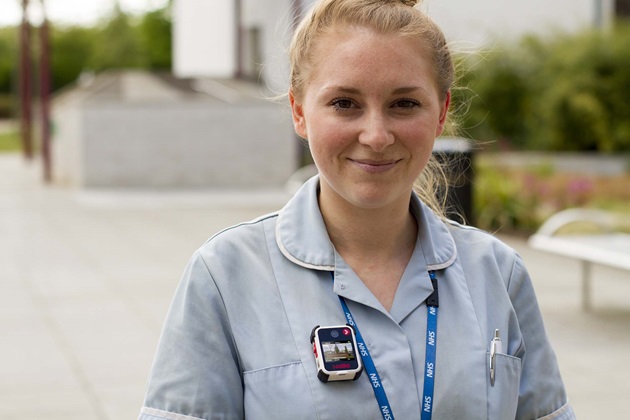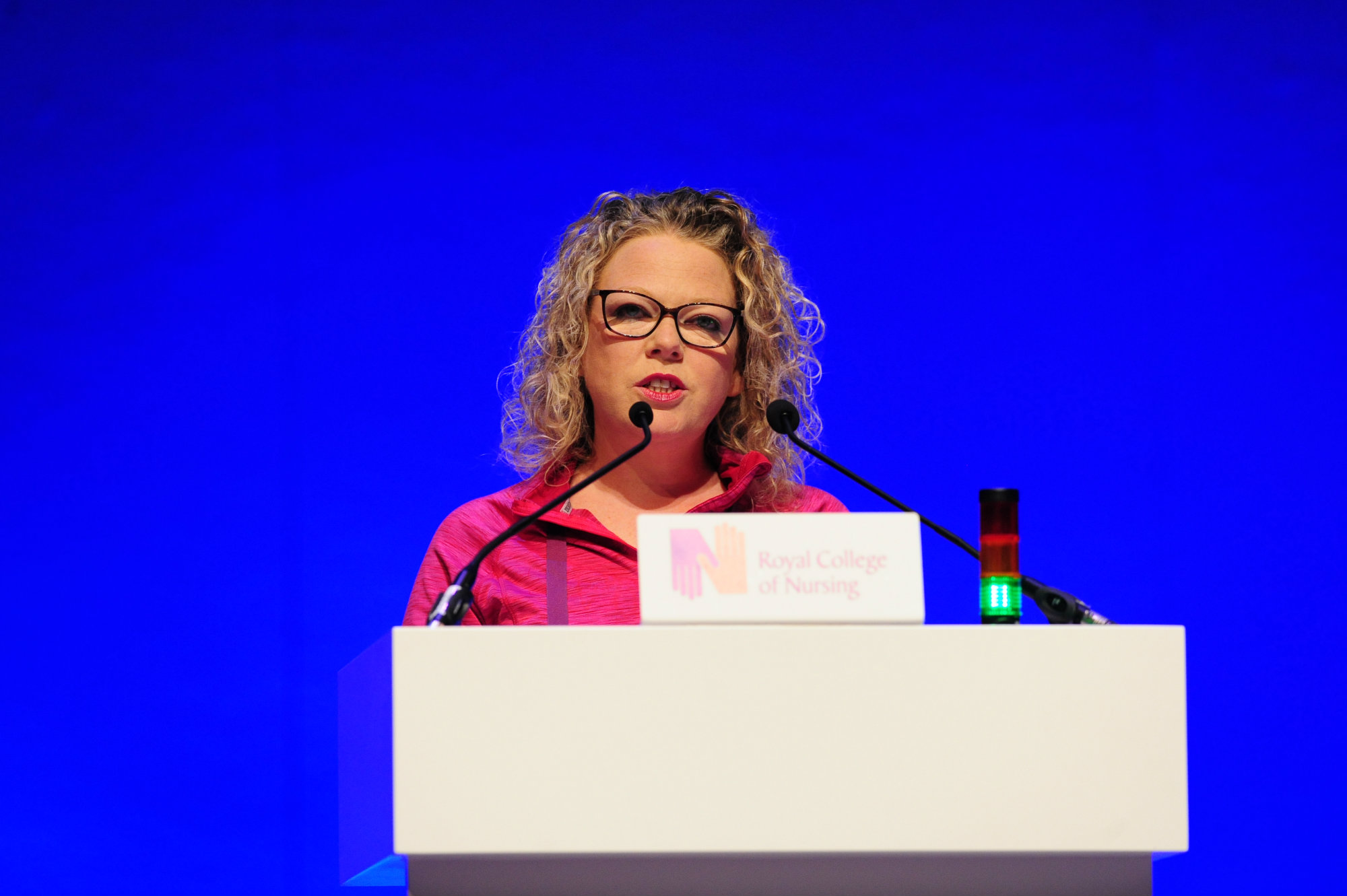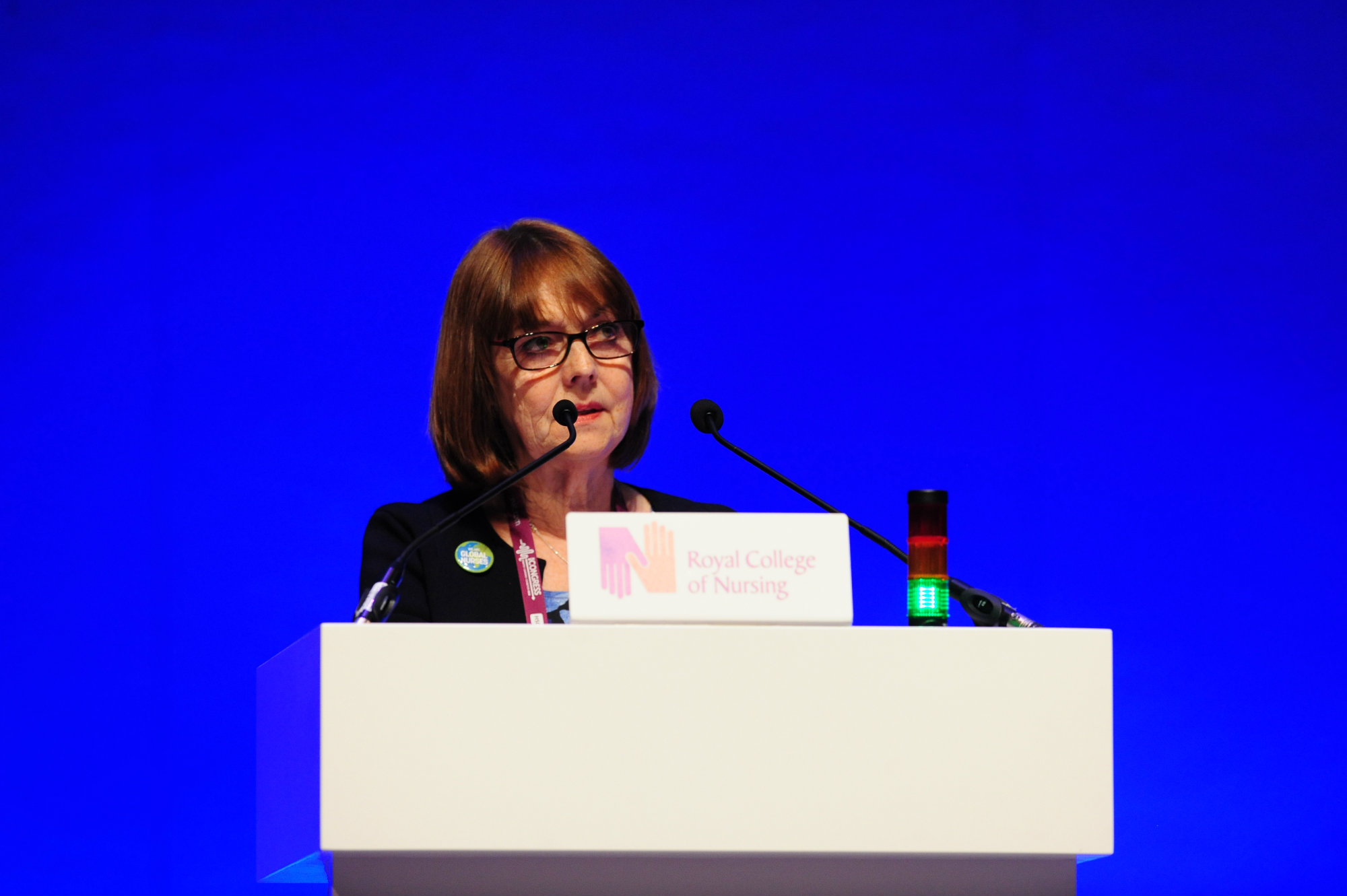Evidence shows that nurses and other health care staff are more likely to face violence and aggression at work than people in other professions. At RCN Congress, members debated whether the use of body cameras in clinical settings could help to combat this.
Sarah Seeley, who led the debate, said: “It’s a question of improving safety – not just for staff but for patients too.
“Lots of areas already use body cameras, like the police and even some security staff in hospitals, and the feedback is positive. People on both sides feel safer and it can be a deterrent to aggressive behaviour, so why shouldn’t we use them more widely?”
It’s a question of improving safety – not just for staff but for patients too
However, Sarah is quick to stipulate that body cameras wouldn’t be suitable in all health care settings.
“The most important thing in the relationship between nurses and their patients is trust,” said Sarah. “Nurses are usually the closest person to a patient.
“Body cameras could potentially create a barrier in that relationship. That’s why they need to be used at the right time, in the right place and with the right group of staff.
“Every setting would need to be individually assessed with a proper policy and guidelines put in place. We’re not suggesting that all nurses should wear body cameras but in some cases, such as on the frontline, it could bring benefits.”
Tackling violence and aggression
Recent figures show physical assaults on NHS staff in England rose by nearly 10% last year.
The data, based on FOI request responses from 181 out of 244 NHS trusts paints a shocking picture.
Overall 56,435 assaults were reported with a high number taking place in A&E departments.

Sarah, who works in A&E, said: “We see a high volume of frequent users who regularly behave aggressively for a multitude of reasons.
“Body cameras would mean we could approach the situation in a different way. For example, we could say ‘I will turn the camera on if you don’t stop behaving in this manner…’
“This may act as a deterrent. If the person does continue to be aggressive then footage from the body cameras can be used as evidence to reinforce any zero tolerance agreements that we have in place with patients, or in the case of a serious assault, it can be used as evidence for the police.”
Body cameras would mean we could approach the situation in a different way
Evidence of assaults against health care staff will become more significant if the Assaults on Emergency Workers (Offences) Bill is passed.
The Bill, which is currently passing through Parliament, would mean increased protection for nursing staff in England and Wales.
It includes proposals to make it a specific offence to physically assault health care staff and other emergency workers, with tougher sentences for people who carry out such attacks.
In 2015 Cardiff and Vale University Health Board introduced body cameras for security staff in hospitals.
Speaking to BBC Wales recently, Head of Security Damian Winstone said the body cameras were more effective than traditional CCTV and had led to successful convictions.
Helping patients feel safe
The need for evidence is a recurring theme in the argument for body cameras, especially in frontline areas, but a study carried out last year at an inpatient mental health unit in Northampton, highlighted strong clinical benefits too.
The study at Berrywood Hospital saw clinical staff wear body cameras when responding to alarms on the unit. The outcome was that both staff and patients said they felt safer, and the number of violent incidents and the use of restraints decreased compared to the same period in the previous year.
Lindsay Bennett, a mental health nurse and one of the study leads, explains how the idea came about: “For a while, we had been thinking about how CCTV and cameras could help with de-escalation or with investigating complaints.
“The reality is that lots of service users are already using their own phones or mobile devices to film interactions with staff but we needed a system for everyone; one where the service user can ask for something to be filmed too so it’s a safety net for both sides.”
Lindsay made sure that patients were at the centre of the study.
“This is different from porters or security staff wearing cameras,” says Lindsay. “From the beginning our main focus was whether patients would be OK with clinical staff wearing body cameras.
From the beginning our main focus was whether patients would be ok with clinical staff wearing body cameras
“We spent a lot of time – 18 months in fact – talking to patients and staff about this before we actually started using the cameras. We asked staff and patients to complete a simple survey with participants stating whether they agreed or disagreed with the use of body worn cameras. Both staff and service users came back to say they thought it would be a good thing.”
Although the study showed positive results in relation to the number of violent incidents decreasing, interestingly it also indicated improvements in the relationships between staff and patients.
The trust’s discharge survey showed that four out of the five wards’ scores had improved for the question “Were you treated well by the staff looking after you?” during the time in which the study took place.
Lindsay thinks there could be a correlation: “People felt safer. Service users and their families and carers were more reassured because they knew that cameras were being used to record when staff were responding to certain situations.”
When looking at the results, it’s hard to see the negatives and, according to Lindsay, the only thing that stood out was the time commitment: “It did have an impact on the workload for individuals and my team in particular. There was special training involved and then time was needed to download and review the footage. It’s an additional strain on staff but apart from that we didn’t have any significant problems.”
A powerful tool for learning
Lindsay, who has been nominated for an RCNi Mental Health Practice Award, is now looking to extend the study to use body cameras more widely and film other interactions between staff and patients on the unit.
Lindsay says: “Using body cameras can be a deterrent for violence and aggression in some cases, but for us, that isn’t the be all and end all. In the long term, this is about improving care.
“When staff watch footage of themselves in a situation, they realise what they could improve on. It’s difficult to see this in the moment when emotions are running high but watching something back can give you an invaluable insight to how you can change your own behaviour and get better at helping someone who is in distress.
Using body cameras can be a deterrent for violence and aggression in some cases, but for us, that isn’t the be all and end all. In the long term, this is about improving care
“It also helps us to identify if there are any patterns of behaviour which in turn allows the nursing staff to improve their care planning as interventions can be far more specific to the patient.
“We also want to use the footage as part of our post-incident reviews so that both staff and patients can reflect on what worked well or what could be done differently next time. It’s a powerful learning tool.”
Overall, Lindsay thinks the most important impact the cameras have had is on people’s wellbeing: “Staff feel more confident and patients are reassured – everyone feels safer. Improved wellbeing results in a better environment which naturally results in less conflict.
What did Congress think?
Putting patients first
The debate at Congress focused largely on how the use of body cameras would impact on patient care.
People shared Sarah’s concerns about how the relationship between nurses and patients might be affected if body cameras were to be used in certain settings.
Maura Buchanan said: “The use of body cameras raises some serious ethical issues for nursing. The police use cameras to gather evidence for criminal cases where there is violence.
“Nurses are one of the most trusted professions so how would that change if we used cameras?”
The use of body cameras raises some serious ethical issues for nursing
Many speakers also raised concerns around confidentiality and capacity – particularly in mental health services – and also the financial impact of such initiatives.
Clair Carson argued: “Surely a better way to manage the events described is to have a more therapeutic staffing approach to care with appropriate levels and skills to manage situations so these don’t escalate to begin with.”
Gillian Burgoyne agreed that there were better solutions to body cameras: “There’s no substitute for a fully staffed, briefed and cohesive team approach and highly trained nurses on the shop floor. We need a positive risk management approach.”
Despite all of the issues brought to the fore, it was clear from the debate that more research in to the use of body cameras is needed, and whatever happens, something must be done to stop the violence and aggression nurses face in the workplace.













